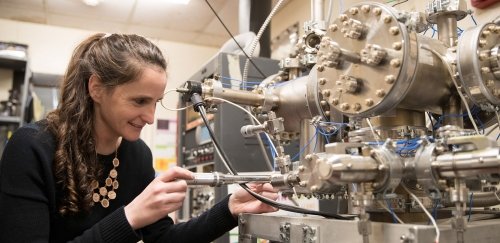In what ways is writing important to your profession?
Writing is critical in both chemistry and physics, both in the research process itself and to communicate scientific findings to a wider audience. Writing is important throughout the research process to keep an accurate record of the motivation, design, results and conclusions of an experiment. After the experiment is complete, it is critical that the findings be communicated to the wider community. This could mean communicating to other scientists who will build on these findings, to government or private employers who will use them to guide policy or to design technology or to the general public to help them make informed decisions on scientific issues.
Which courses are designated as satisfying the Writing in the Discipline (WID) requirement by your department? Why these courses?
- PHYS 313: Junior Lab
- PHYS 413: Senior lab
In these courses, you will engage in a series of experiments and are expected to keep an accurate lab notebook. In Junior Lab, you will be introduced to the various sections of the formal lab report and learn what information should be included in each section. In Senior Lab, you will learn to put all the pieces together to produce a complete formal lab report.
What forms or genres of writing will you learn and practice in your WID courses? Why these genres?
You will focus primarily on two genres of writing. These genres are related to the two purposes of writing in physics and chemistry: to record the research process and to communicate scientific findings to a wider audience.
For the first purpose, you will focus on keeping a lab notebook. A lab notebook is not just a compilation of data, but a narrative of the entirety of the experiment. It is not only a document kept for personal use but can also have legal, financial and ethical implications. The keeping of an accurate and properly formatted lab notebook is a critical skill for a scientist.
For the second purpose, you will focus on the formal lab report. This format is similar in many ways to that of professional journal articles in physics and chemistry. These types of articles are the main way scientists communicate their findings to the broader scientific community.
What kinds of teaching practices will you encounter in your WID courses?
You will get explicit instruction and feedback on how to keep a lab notebook and write formal lab reports. This includes the correct format for these genres as well as how to use scientific literature as a resource, how to correctly present results and draw conclusions and how to correctly cite scientific literature. For the formal lab reports, you will produce multiple drafts of the reports and receive feedback both from your instructors and in peer review.
When you have satisfied your department’s WID requirement, you should be able to:
Keep an accurate and correctly formatted lab notebook and write a correctly formatted formal lab report. This includes knowing the purpose of each section of the report (abstract, introduction, experimental methods, etc.); using data to support scientific conclusions; and communicating to other scientists in the discipline as well as to a broader audience.

